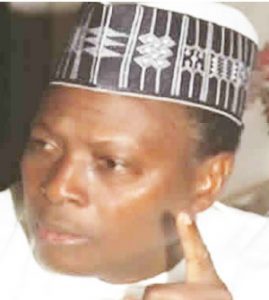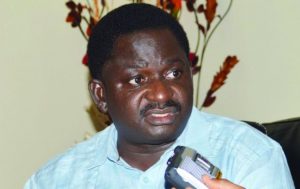Nigeria returned to full scale war by the end of last week. It is always at war anyway, always talking about democracy while moving farther and farther from it, in the words of Olusegun Obasanjo, its two time leader. The war this time is neither against any of the insurgencies the nation has been confronting nor any such threat. In this comparatively more pleasant but no less destabilizing commotion, the combatants are two stubborn concepts. On the one hand is Buhari/APC mandate secured in an election considered free, fair and more credible than anything before by Nigerian standards. On the other hand is a nation stranded, a nation that cannot find the president because the president is sick, out of the country and with no declared date of coming back.
This contradiction has pitched the nation against the mandate, a war in which all sorts of instruments are being deployed on both sides. Nothing may better capture this stalemate than Aisha Ysusf’s broadcast to the world last Friday. It must be an evidence of war for a veiled northern woman to engage the system loud and clear through an audacious demand that Mr President frees the nation from the burden of his mandate before it becomes truly a burden. Aisha Yusuf’s intervention came on the heels of a claim of politicians hobnobbing with military officers in what could only be a pregnant embrace. That came straight from Tukur Buratai, the head of the army and a Lieutenant-General. All two dramatic developments point at how dangerously the nation is dancing with fate again. In a clime which does not tolerate suspense, these are compelling reasons for a choice to be made between the nation and the mandate.

Dr Junaid Mohammad, a critic
Fortunately and unfortunately, both the partisans of the nation and the mandate are each fragmented and suffering from crisis of mission. Within the nation, two dominant subject positions can be found. There are those who do not want Buhari to go, either by resignation or impeachment. They wish the president were not sick in the first place. They even think that he or some people can govern on his behalf, sickness or no sickness in so far as they see him as the only anti-thesis against corruption in Nigeria. In here, you find those who find in Buhari the model of the puritan, the cleanest and the most disciplined, the punisher of rascality in power. On the opposite side of this group are those who would be so relieved today should Buhari resign or be impeached. They haven’t found the stellar performer in him, they see more of a divisive leader in him, especially along religious and regional lines and they find unacceptable his conduct of government business on many grounds. So, the nation itself is divided.
The partisans of the mandate are no less divided, irrespective of profuse claims to the contrary. There are those who see Buhari as alienating and alienated because he is basically deficient in the praxis of party politics; there are those grumbling under their breadth regarding his take-over by a cabalistic fortress just as many defenders of the mandate see the anti-corruption war as a needless distraction that could have been fought via an institutionalist mode rather than muscular fire-fights that unravels in the full glare of television. In short, Buhari has so many antagonists within just as he has die-hard protagonists who have positioned themselves as combatants, particularly those whose power calculations would face a very uncertain future should the Buhari presidency be dismantled midway.
So, even as broadly ranged in a war of nation versus mandate, there are internal combustions within each camp that makes a single or dominant reading of Buhari impossible, except for the irredeemably prejudiced mind. For, from these constellations in both camps, Buhari comes off as dividing and uniting, doing and undoing, developing and underdeveloping, fragmenting and integrating, all at once. It would have been the contradictory combination of these diverse features that would have shaped his rule vis-avis 2019.
That is if he were well. But he is not well, a point he himself has made. But how sick is he? So sick would be the reply of those who have even gone ahead to simulate his death several times. They can only be understood to be throwing in that tactic as part of the nation versus mandate war. But, in such simulation, they have a powerful tactic to the extent that they are constructing the Buhari Presidency as a particular type of presidency – sickly, ineffectual and usurped, a presidency that is not original. So, even if Buhari manages to resume, he has to do much to reclaim and stabilise his grip on power as things are now, no thanks to the performative mediatization of his illness. The lesson for practitioners of strategic communication is that it is one thing for a president to be sick, it is a completely different thing how the sickness is represented in the media. If the presidential town crier, for instance, does not resist the temptation to turn preachy rather than innovate, huge representation cracks could develop on the wall.

Femi Adesina, Presidential spokesperson and supporter
However, supposing the president ‘bounces forward’ after the shock as students of resilience would say. Has the nation prepared itself for that possibility? It is never going to be the Muhammadu Buhari of 1983 or even of 2014/15 APC Presidential campaign again. But modern medicine is and can do wonders. What if there is a medical ‘American wonder’? There are just too many tell tale signs pointing at this possibility.
The first is the use of the word Acting President which presupposes a returning president. In other words, there is a hint in that word that the president could come back. It cannot be reduced to cabalistic bravado. There is no way any cabal could put that word if there is no chance of a return in the context of Buhari’s return to the UK. Of course, the question here would be return as what – to be seen only once a week in the Villa Mosque or a president strong enough to function basically.
The second is the activation of the uniquely Nigerian culture of speaking to itself through silence. Like the tortoise, it expresses reckoning with silence. Silence is the tortoise’s own way of agreeing with a position, request or coming to terms with a reality. Whenever Nigeria is silent or when you see those who should know keeping quiet, it should dawn on you that Nigeria is coming to terms with what it had not bargained for. Apart from Aisha Yusuf, the lips of those from whom you can guess what is happening to Buhari remained sealed for much of last week, suggesting that everything is not going according to the hoopla. Hoopla! Yes, remember the word. That is the word Asiwaju Bola Tinubu used the other day when he descended on everyone else for imagining a cabalistic fortress that has seized power noiselessly in the Villa. The hoopla is the problem for the Asiwaju who even invested President Buhari with a historic mission to fulfil. It was the strongest indication that Buhari may not only bounce back in power but even bounce forward. If Asiwaju got any hint of something terminal, the language of standing shoulder to shoulder with Buhari would certainly not have been so categorical in a written statement. Could one be reading too much into text or is it the Nigerians who are not making anything of the texts?
So what even if a medical American wonder, many would ask. And they cannot be dismissed. There are enough grounds to worry about in Nigeria. There is a clear and steady rise of violence and that is along with a record low tempo of government and governance. Meanwhile, the budget is in search of who would sign it as part the rituals thereto. Not that the budget is of much importance. After all, 66% of it will be paid to Nigeria’s domestic creditors, about 15%, if not more, would be stolen. It is understood it is now done under the table unlike when it was an open show previously). So, it is just the remaining 20% or less that the rituals are all about.
The nation is totally incoherent as to be in need of presidential personal touch much more than the formalities of governing. This is what Buhari is nowhere to give partly because that expressive, instantaneous and dialogic subjectivity is not part of his consciousness and partly because he is ill and away.

Some members of the National Council of State
Some people would say that the task of resolving the impasse is for statesmen. They argue that only a body unconstrained by political interests and sentiments can wade in and come out with options that guarantee that Nigerians do not continue to suffer collateral damages because of the way the mandate of a political party unravels. Where does anyone find statesmen in Nigeria who are above interests and individual or group sentiments? Certainly not the National Assembly whose largely northern leadership would not contemplate what would be regarded as regional treachery in impeaching the president. The Federal Executive Council should be the last body of players to be thought of because of even the immorality of appointees sitting back to undo their appointer who is still sick and in need of compassion and solidarity. The party? Not with what Asiwaju is saying as reported above. The National Council of State? Uhm! Up to a point but who will call the meeting in the first case? Of course, the Acting President can call the meeting but would he call it? in this respect, Osinbajo is a student of IBB: he does not tolerate undue radicalism. The implication is that he will never call any such meeting unless and until Buhari asks him to. He could be his own man but not as long as this war between the nation and the mandate lasts. Nigeria loves leaving her problems hanging, until individuals such as Aisha Yusuf become so indignant, gives expression to such feeling and provides the rest with someone to blame for a society’s directionless.
But even before the war is over, it is indicating to everyone already how inferior our formal processes – constitutional provisions, institutions, mechanism, etc are relative to the informal processes: the unwritten consensuses, sentiments and cultural protocols which have overwritten the grand provisions and celebrated guarantors of the formal systems. If we were that organised, it is a reality to put the five or so of Nigeria’s toughest political scientists to produce a slim monograph on how this is the case or the extent to which it is the case and use that as a key document for the perfect constitution we have always wanted to write.



























